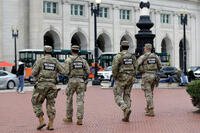This article by Jeff Schogol originally appeared on Task & Purpose, a digital news and culture publication dedicated to military and veterans issues.
President Donald Trump has decided, for now, not to attack Iran after asking his top advisers for military options to stop Iran’s nuclear weapons program, according to the New York Times.
Trump reportedly asked about launching strikes against Iran at a Nov. 12 meeting with his top advisors, including Army Gen. Mark Milley, chairman of the Joint Chiefs of Staff, and Acting Defense Secretary Chris Miller, the New York Times reported.
The previous day, the International Atomic Energy Agency had reported that Iran’s stockpile of uranium had grown by 12 times since 2018, when the president withdrew the United States from a nuclear agreement struck with Iran under former President Barack Obama’s administration, according to the newspaper.
Trump’s advisors warned the president that any military strike against Iran could escalate into an all-out war, the New York Times reported.
When asked about the New York Times’ reporting, several military and White House officials declined to provide a comment for this story.
Retired Army Gen. Joseph Votel, who led U.S. Central Command from 2016 to 2019, said that while he does not have any specific insight into whether the president is considering striking Iranian nuclear sites, the U.S. military should expect Iran to retaliate for any attack.
“Iran has already demonstrated that they will respond to our actions and we should always expect that they will do so,” Votel told Task & Purpose. “It would be foolish to not expect or be prepared for a reaction.”
Iran has the ability to strike U.S. military installations in the Middle East and can attack shipping routes in the Strait of Hormuz. Indeed, the Pentagon dispatched more U.S. troops to the Middle East last year following attacks on Saudi oil refineries that were blamed on Iran.
In January, Iran launched ballistic missiles at Iraqi bases that host U.S. troops in response to a U.S. airstrike in Baghdad that killed Maj. Gen. Maj. Gen. Qasem Soleimani, commander of the Islamic Revolutionary Guard Corps.
Even though the U.S. military had hours to prepare for the ballistic missile strikes, 110 U.S. troops were diagnosed with mild traumatic brain injury after the attacks, for which 29 soldiers were awarded the Purple Heart.
Iran also holds sway over Shiite militia groups in Iraq such as Kata’ib Hizbollah, some of which breached the front gates of the U.S. embassy in Baghdad last year.
The U.S. military has blamed these militia groups for deadly rocket attacks in Iraq, such as one attack on Camp Taji in March that killed two service members, leading to reprisal airstrikes.
Notably, those airstrikes did not stop further attacks on U.S. troops in Iraq.
Trump has made bellicose statements in the past about Iran, such as after Islamic Revolutionary Guard Corps Navy boats made dangerous maneuvers around U.S. ships in the Persian Gulf this April.
“I have instructed the United States Navy to shoot down and destroy any and all Iranian gunboats if they harass our ships at sea,” Trump tweeted after his favorite show Fox & Friends aired a segment about the incident.
As of yet, no naval battle between U.S. and Iranian forces has occurred.
More articles from Task & Purpose:
• The forgotten soldiers behind Netflix's 'The Liberator'
• Thousands of troops will depart Iraq and Afghanistan before Trump leaves office
• We salute the USS Ronald Reagan for rocking its battle flag on its way back to port











